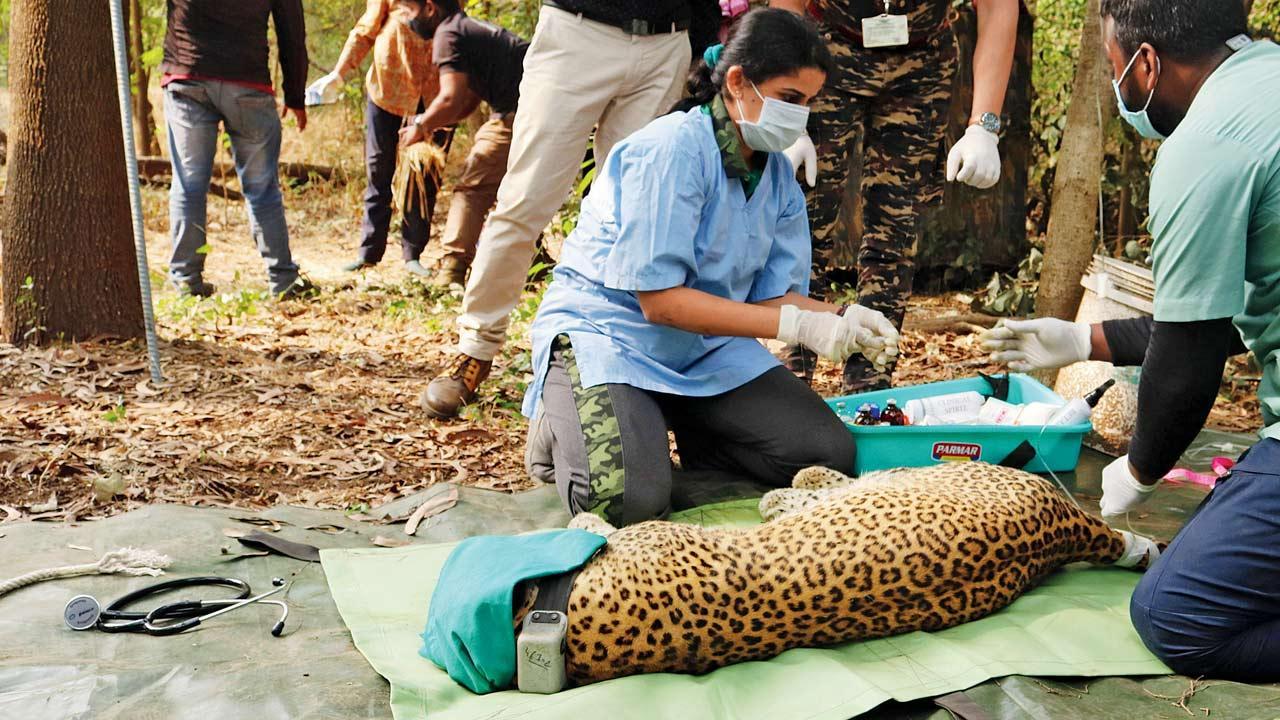Officials to monitor cat using camera traps, say city leopards coexisting with humans

The collaring has helped the forest department and researchers in understanding the food habits of the leopard, too
After observing for over a year that the female leopard C-33 Delta has been coexisting with people despite roaming very close to human settlements, the team monitoring leopard activity in the Aarey Colony has now dropped its collar. The team will now continue monitoring C33 using camera traps. C33 was radio-collared and released into its natural habitat on November 12, 2021.
ADVERTISEMENT
Man-animal conflicts
In 2021, a series of human-animal conflict incidents were reported in Aarey Milk Colony. Following the incidents, the forest department and researchers zeroed down on the suspected animal responsible for the attacks. Trap cages were set at Aarey Colony and female leopard C33-Delta was trapped in the cage. It was then taken to the Leopard Rescue Centre at Sanjay Gandhi National Park.
Within a few weeks of the capture of C33, another conflict incident took place in Aarey, which confirmed that C33 was innocent. Later, the forest department trapped female leopard C32-Zeta from Aarey, after which, the conflict stopped. The decision to release C33 was taken post-collaring.
Coexisting with people
C33 also called Delta was radio-collared and released back in the Tulsi Range of SGNP on November 12, 2021. The team of researchers from Wildlife Conservation Society-India including Biologist Nikit Surve, along with Thane Forest Department (Territorial) and the SGNP team have been continuously monitoring the activity of the collared animal 24/7. Biologist Dr Bilal Habib's team from the Wildlife Institute of India (WII) along with the support of the SGNP administration have collared the leopard.
SGNP Field Director and Conservator of Forest(CCF) G Mallikarjun said, "When the suspected leopard C32 - the sibling of C33 was successfully caged, the decision to radio-collar Delta was taken and it was released back into its natural habitat. We wanted to know how C33 would behave post collaring. After radio-collaring, we have gathered interesting data about its movement. It has also come to light that C33 frequently travels between SGNP and Aarey and despite roaming very close to human settlements, the animal avoids humans. This shows how the Mumbai leopards are coexisting with people. As our motive of collaring this particular animal has been completed, we have dropped the collar of C33."
Observations
According to the data received from its collar from November 9 till February 14, the leopard has travelled approximately 295 km (rough estimate as the distances calculated are in straight line format at every one-hour interval). The collaring is also helping the forest department and researchers in understanding the food habits of the leopard. The collar is also helping understand how these leopards use a highly human-dominated landscape and how they are peacefully coexisting.
It has been also observed that C33 has killed a variety of species ranging from poultry to spotted deer, but a majority of the prey items have been domestic prey. She usually visits the carcass for 1-2 days if it’s a big prey like in the case of an adult spotted deer and domestic dog. She normally rests for 24 to 40 hours after feeding on large prey.
Another important observation from the C33 journey post collaring is that she has come very close to the Western Express Highway, near Goregaon as well as Mohan Gokhale Road on a couple of occasions. The researchers have recorded her resting on top of abandoned human settlements even while people are nearby, which also proves the fact that peaceful coexistence is possible. C33 has also been seen courting on two occasions, once by the forest department and once by BNHS volunteers near the BNHS-CEC campus.
 Subscribe today by clicking the link and stay updated with the latest news!" Click here!
Subscribe today by clicking the link and stay updated with the latest news!" Click here!







